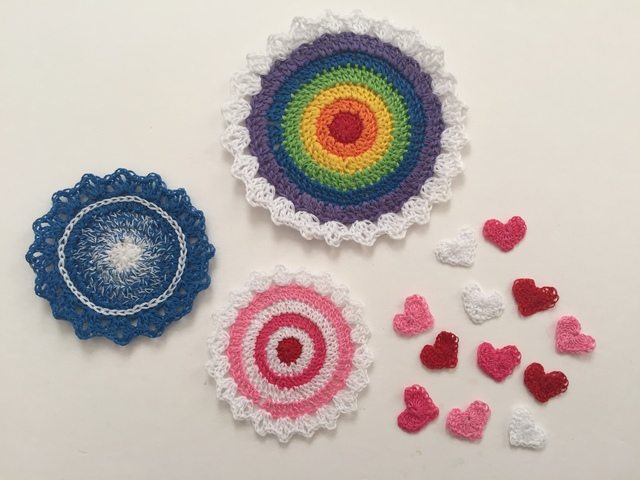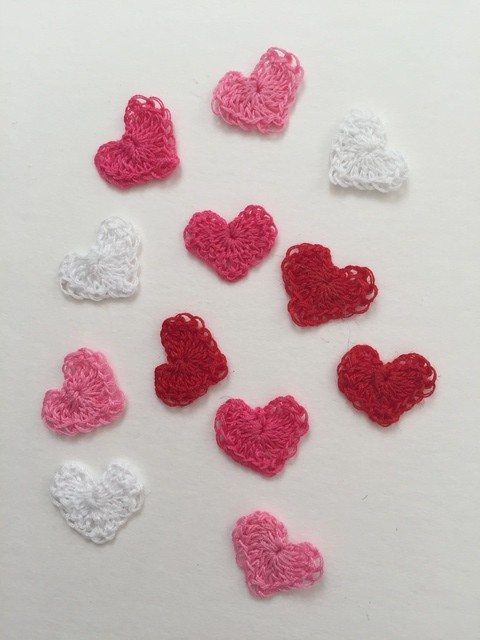Thanks to everyone who has participated in the Mandalas for Marinke remembrance project. The deadline to contribute has passed (contact me if you needed an extension), but that doesn’t mean our daily posts are coming to an end. Far from it. I still have well over 100 contributions to share with you including today’s contribution from Pamela.
See all Mandalas for Marinke here
I was so delighted to receive this contribution. It includes three tiny crochet mandalas that are perfectly detailed. I always love the rainbow crochet mandalas and I always love the thread crochet mandalas so I especially love Pamela’s thread crochet rainbow mandala based on Wink’s free 12-round standard crochet mandala pattern. Pamela explains on her blog that:
“They’re worked on either 1.3mm or 1.65mm hooks using sewing thread. The smallest pink one is worked using two strands held together and the largest rainbow one is four strands held together. I think the blue one is probably three strands but it was the first one I did so I don’t remember. I wet blocked them with a little starch to help them hold their shape.”
I am also enchanted by the tiny little thread crochet hearts. They’re a really special, sweet addition to the mandala contributions. So small they’re practically micro crochet, so perfectly stitched, so adorable. And I was surprised to learn that tiny crochet is relatively new for her; she shares some tips for tiny thread crochet on her blog. I’ll be finding a special way to incorporate these into the project.
I also had to share her wonderful packaging. I really don’t care how the mandalas are packaged … some are folded in basic envelopes, others are kept between cardboard inside bubble mailers to prevent wrinkles, some have beautiful cards, others come with no note at all … and I believe that each and every one is perfect the way that it is. It’s the right thing for that person at that time. But I did want to share the genius little packaging that Pamela used. Her little contribution came in a regular envelope, but she tucked each mini mandala inside of its own little circular holder made of two pieces of card stock stitched together absolutely beautifully with the same colors of thread used in the mandala inside. It’s a simple little package that shows thoughtfulness, attention to detail and care and I just love it.
All of this comes from Pamela who blogs at The Unknown Orchard. In addition to crochet, she enjoys knitting, sewing, origami, drawing, cooking and baking. She writes:
“Thanks so much for coordinating this project and also for extending the original deadline. Depression has been a part of my life for a long time and getting things done on a deadline can be difficult.
I didn’t know Wink but I love her patterns and the beauty that she brought into the world. Reading about a fellow sufferer of depression committing suicide hits you particularly hard if you have those suicidal thoughts, too, and you can easily imagine yourself in their shoes.
I’ve made some mini mandalas and little hearts using Wink’s crochet patterns to help remember her by and to help myself keep going. Crochet and my other hobbies have been a great way to connect with other people and remain creative and productive.
I hope Wink’s family and friends know that her suicide is not a reflection of their relationship and they shouldn’t feel responsible for what happened.”
Pamela’s words resonate with me. Deadlines can be hard for me, too, when I’m struggling with depression. I’m usually ahead of deadlines in my life so when I miss one I tend to feel excessively guilty and stressed out and have to work hard not to let it get to my self-esteem, all exacerbated by periods of depression, of course. And that’s a catch 22 because depression requires so much sleep and rest that it’s the time most likely to cause me to miss deadlines.
I appreciate that Pamela mentioned this because it made me want to learn more about the relationship of deadlines to depression. About.com Depression expert Nancy Schimelpfening explains that there are different types of procrastinators but in general, “procrastination becomes a way–no matter how maladaptive– of coping with the emotions and physical symptoms that accompany depression” and “The symptoms that we face, such as fatigue and hopelessness, make it so easy to say to ourselves, “I’ll just put this off until tomorrow when I feel better”. Before we know it, that deadline is creeping up on us and we’re starting to panic”.
A great short article for college counselors explains that students may come in to the office and express extreme emotions about deadlines and that it’s important for counselor to realize that this may just be the tip of the iceberg of other issues, particularly depression. And of course this can be true in the workplace as well. Many reports discuss the financial cost of depression, including the issue of lack of productivity in the office because of the symptoms of depression, which can include missing deadlines. There are plenty of tips for productivity even during depression but I think what’s most important for the individual struggling withe depression to practice as much gentleness and self-care as possible.
I was also intrigued by an interview with Julie Fast, author of Get It Done When You’re Depressed, who shared thoughts about self-employment:
“Somebody who already has a propensity towards depression, or whatever, is naturally going to go to their own business instead of being able to handle the big corporate business world. So I think a lot of people who are self-employed definitely have more anxiety, ADHD, depression.”
The difficulty here, the one I personally deal with all of the time, is that there’s no safety net in self-employment. You have to do the work or you don’t make any money. So even though I definitely gravitated towards self-employment because of my depression, I have also had to work as hard as possible to overcome my symptoms of depression to keep an income coming in. It’s a difficult conundrum.
Julie Fast says, “Depression is never going to let you feel good, so you have to work anyway. That concept changed my life.” And I think that’s true to a large extent. But again, I personally have to balance that with self-care. I have to force myself to wake up in the morning, keep the television off, go ahead and sit down to write even when I don’t feel like it, drag myself through pages of work despite depression … but I also have to know when I really can’t do it and be okay with that and be gentle with myself and accept that there are days when I’m not going to get done what I wanted to get done because the symptoms are going to win. It’s not easy to figure out this balance. I’ve had more than a decade and a half of self-employment through depression to learn these skills and I feel good about where I’m at but it’s not easy.











Kathryn I think this definitely what happened to me in part….with the other things I told you…thanks for this…💜🙏